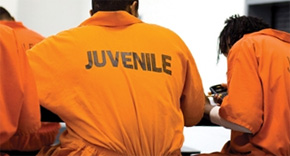Juvenile Diversion Push Gets Start In Florida Senate
February 5, 2017
A Senate proposal aimed at keeping young offenders out of the criminal justice system got off to a rocky, but successful, start passing its first committee despite concerns from some Republicans and law-enforcement officials.
The Senate Criminal Justice Committee approved the measure (SB 196) on a 5-2 vote, with Sen. Rob Bradley, R-Fleming Island, and Sen. Jeff Brandes, R-St. Petersburg, opposed. But even some of the lawmakers who supported bill, offered by Sen. Anitere Flores, R-Miami, said they were uncomfortable with some provisions.
Supporters say programs that issue civil citations to young offenders or otherwise send them to pretrial diversion programs can save money and help youths avoid being marked for the rest of their lives for youthful indiscretions. Children in diversion programs are required to do community service and receive counseling, substance-abuse help or other interventions.
 The programs are either in place or are being put in place in 62 of Florida’s 67 counties.
The programs are either in place or are being put in place in 62 of Florida’s 67 counties.
Flores’ bill would require counties to have programs and would require law-enforcement officers to issue citations if juveniles commit one of a list of nonviolent misdemeanors for the first time. Officers could also issue citations for other misdemeanors or for second or third offenses.
According to supporters, about 10,000 children were eligible for civil citations during the state’s last fiscal year, which ended June 30, but didn’t receive them. Flores said that included 620 offenders who were 12 years old, and some who were even younger.
“There are three 7-year-olds somewhere in the state of Florida that committed one of these misdemeanors and were put into the criminal justice system — at 7 years old,” she said. “That is wrong. It is wrong. And we have an opportunity to get it right.”
The bill is in line with a push by Senate President Joe Negron, R-Stuart, to offer for more diversion programs for younger offenders.
Even some boosters of civil citations, though, argued that Flores’ bill goes too far. Pinellas County Sheriff Bob Gualtieri, whose department frequently uses diversion programs, said data about children who could receive civil citations under the bill hasn’t been closely examined.
“What’s included in that data are kids who are 17 years old, 6-foot-2, 230 lbs., who smack their mom in the face,” he said. “There are kids included in that with a heroin syringe. There are kids included in that with a crack pipe.”
Gualtieri also said officers might be less willing to lower crimes that would technically qualify for felonies down to misdemeanors — in order to give young offenders a break — if the officers would then have to issue civil citations.
For example, if a shoplifter was caught with just over the amount that makes retail theft a felony, the officer might decide under the new law to go ahead charge the juvenile with a felony. Currently, an officer might go with a misdemeanor.
“When you’re taking away discretion, you’re totally taking it away,” Gualtieri said.
Brandes was among those looking for another way. He proposed, then pulled, an amendment that would have limited the bill’s requirement for civil citations by making it apply only to offenders younger than 14. It also would have allowed only drug-paraphernalia offenses related to marijuana to be eligible for diversion programs and would have excluded domestic batteries from the list of misdemeanors.
Brandes’ amendment would have also made it easier for juveniles who enter pre-arrest or post-arrest diversion programs to have their records expunged.
“Ultimately, my belief is that law enforcement should never be left in a position where they can’t remove somebody and arrest them if that’s what they feel is the absolute best issue,” he said. “But also, we should not let children carry this around with them like a scarlet letter the rest of their lives, either. And so the ability to expunge those records to me is ultimately what will get us to the place where we feel comfortable with the policy.”
by Brandon Larrabee, The News Service of Florida
Comments
4 Responses to “Juvenile Diversion Push Gets Start In Florida Senate”



What happens if, and when the family cannot pay the citation? My concern is that juveniles end up getting arrested again for failure to pay fines like many juveniles in northern states?
Let the kids parents pay for this instead of the tax payer
Sounds to me like they can do pretty much anything and just laugh about it. Maybe I am wrong. Maybe this plan will help. Maybe.
I always think these kids had no up-bringing. Children cannot raise themselves. They want to be like the other kids. With advise and a plan to follow they can follow the right path. This sounds like a great program to me.